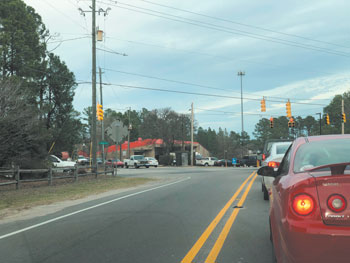 The lack of traffic on North Carolina’s highways caused by shelter-in-place orders related to the COVID-19 pandemic is forcing the North Carolina Department of Transportation to delay numerous road projects statewide. A number of them are in the Hope Mills area.
The lack of traffic on North Carolina’s highways caused by shelter-in-place orders related to the COVID-19 pandemic is forcing the North Carolina Department of Transportation to delay numerous road projects statewide. A number of them are in the Hope Mills area.
Earlier this month, NCDOT released a list 20 pages long of road projects across North Carolina that have been put on hold as a direct result of the COVID-19 pandemic.
It’s not safety issues preventing the workers from completing projects. The money normally available to pay for the work has evaporated.
Many state road projects are funded through the Motor Fuels Tax, Highway Use Tax and fees from the Department of Motor Vehicles.
With driving dramatically curtailed because so many people are staying at home, there is currently a budget shortfall of $300 million for NCDOT for the current fiscal year, which ends on June 30.
Projects that were already underway or that have already been awarded won’t be affected.
In addition to a release from the NCDOT, Hope Mills Mayor Jackie Warner was briefed on the delays during a recent conference call involving Cumberland County’s mayors along with representatives of the county Board of Commissioners and representatives of the city of Fayetteville.
“So much is happening with the highways in Cumberland County,’’ Warner said. “Everyone is concerned. They are moving quickly to get the outer loop finished.”
Warner said her biggest concerns for delays in Hope Mills road construction are at the intersection of Camden Road and Main Street as well as the intersection of Golfview and Rockfish Roads near the proposed new public safety building in Hope Mills.
The intersection at Camden and Main is one of the busiest in Hope Mills.
“That is one of our high-traffic areas,’’ Warner said, noting that a fatal accident recently took place near there. “A lot of development takes
place on that side of town,’’ she said. “That would be the Camden Road section that goes by Millstone Theater.’’
The other big area of concern is where the construction of the new public safety building for the Hope Mills police and fire departments, around Rockfish and Golfview Roads, is hopefully scheduled to begin work sometime this year.
It is already a high traffic area, and the pending construction of the new public safety building is only going to make the problem even worse.
The police department has temporarily relocated to the old Ace Hardware store on South Main Street, while the Hope Mills Fire Department
will continue to operate out of its building on Rockfish Road.
It’s not hard to see how road construction along Rockfish and Golfview Roads at the same time work is taking place on the public safety building could create a serious logjam.
“If that (roadwork) project is delayed and we continue to do work on the public safety building, I see a lot of problems with that,’’ Warner said.
She is hopeful that a town committee that has been working for some time on the Hope Mills Gateway Plan will be able to head off any major headaches the combination of the road construction and the building of the public safety building will cause.
The Gateway Plan group includes various officials and citizens of the town of Hope Mills along with representatives of the Fayetteville Economic Development Commission, Duke Energy and the North Carolina Department of Commerce.
“We’ve had very good strategic planning sessions,’’ Warner said. “We’ve been ahead of what’s going on with Interstate 295 and how it will impact Hope Mills.
“Now we can just add to that concern and talk about what we do now if there is a delay. We have to have an immediate plan. This will give us opportunities to look at what we’re doing with a lot of input. It might mean we need to step back and do a better job.’’
Following is a complete list of all the major Cumberland County road projects that have been delayed by the NCDOT funding shortfall:
1. Bridge 60 over Lower Little River on U.S. 401.
2. Bridge 25 on N.C. 242 over Beaver Dam Creek.
3. 1-95 install broadband fiber from South Carolina state line to Virginia state line.
4. I-95 in Cumberland and Robeson Counties from U.S. 301 (Exit 22) to North of I-95 Business/U.S. 301 (Exit 40). Widen to eight
lanes.
5. Fayetteville outer loop from South of State Road 1003 (Camden Road) to South of State Road 1104 (Strickland Bridge Road.)
6. Fayetteville outer loops from South of State Road 1104 (Strickland Bridge Road) to South of U.S. 401.
7. U.S. 401 (Raeford Road) from U.S. 401 (Raeford Road) from Old Raeford Road to East of Bunce Road.
8. Cumberland, Hoke. State Road 1102 (Gillis Hill Road) from North of State Road 1112 (Stoney Point Road) to U.S. 401 (Raeford
Road). Widen to multi-lanes and replace Bridge 250075 over Little Rockfish Creek.